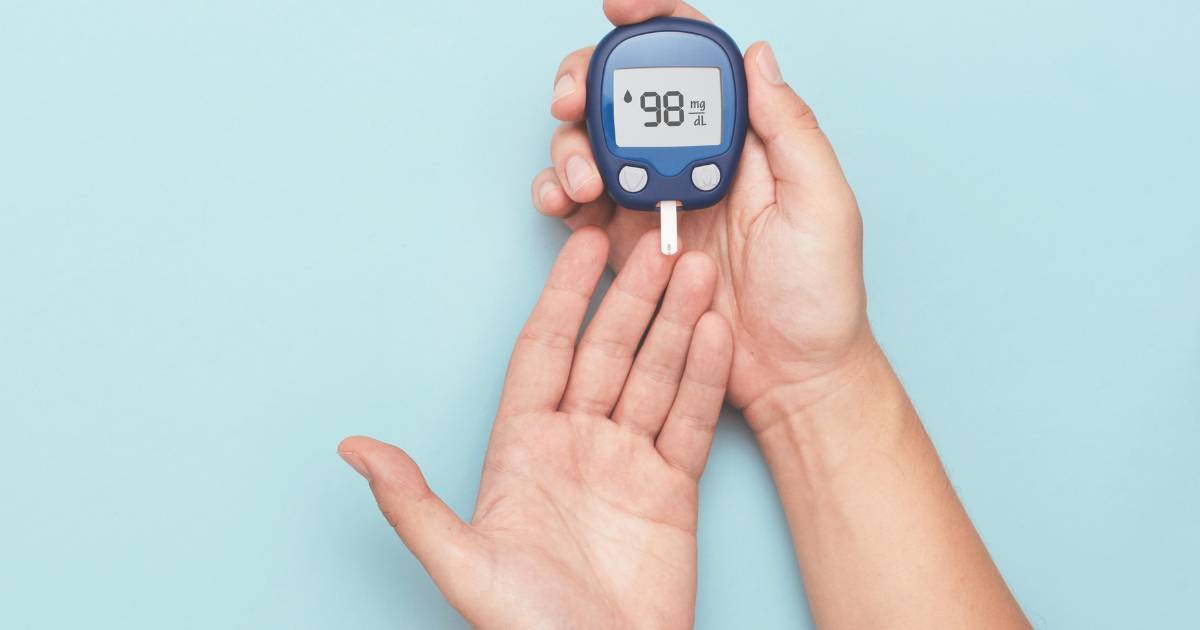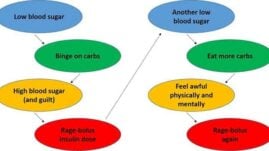People with diabetes must be diligent about checking their blood sugar levels frequently to make sure they are in a healthy range.
Even though people with diabetes often struggle with high blood sugar, they must also be cautious of low blood sugar, which can be dangerous and even fatal.
But what is considered low blood sugar?
This article will explain what low blood sugar is, why people with diabetes experience low blood sugar, and how to treat and help prevent low blood sugar levels.

Table of Contents
- Why do people with diabetes get low blood sugar?
- What are the causes of low blood sugar?
- What is considered low blood sugar?
- At what level does low blood sugar become dangerous?
- What are the symptoms of low blood sugar?
- What are the consequences of low blood sugar?
- How can you prevent low blood sugar?
- Can low blood sugar be deadly?
- How can I raise my blood sugar quickly?
Why do people with diabetes get low blood sugar?
People both with and without diabetes can suffer from hypoglycemia or low blood sugar.
Having low blood sugar means that there is simply too much insulin in your system and not enough glucose for your cells to function properly.
People with insulin-dependent diabetes can be especially prone to low blood sugar levels.
This is because counting carbohydrates and dosing insulin for every meal and snack can be an imprecise science.
Sometimes you may dose your insulin for a meal and not finish that meal, or maybe the meal had fewer carbohydrates than you anticipated.
The timing of the administration of insulin also matters a lot.
If you take your insulin for a meal and do not eat within a specified time frame, you may also suffer from a low blood sugar level.
Experiencing low blood sugar levels is very common if you have diabetes. It is part of everyday life.
The average person with type 1 diabetes experiences two episodes of low blood sugar per week.
Do not blame yourself if you have low blood sugar frequently.
However, contact your doctor if it is affecting your quality of life. They can help you adjust your medications to try and lower the frequency of your low blood sugars.
What are the causes of low blood sugar?
There are many different causes of low blood sugar. Some of them include:
- Taking too much insulin for a meal
- Not eating enough for insulin already taken
- Miscalculated carbohydrates in meals and snacks
- Too much exercise, especially if you still have a lot of insulin in your system
- The timing of your insulin (did not eat quickly enough after taking insulin)
- Hormonal changes, like puberty and menopause
- Pregnancy (early stages)
- Drinking alcohol, especially hard liquor
- Hot weather
- Insulin sensitivity changes, due to weight loss
- Change in your schedule, especially your insulin dosing schedule
- Changes in your diet
What is considered low blood sugar?
What is considered low blood sugar will vary by the person.
It will depend on what you and your doctor deem to be too low for you to be comfortable and function normally (physically and mentally.)
Some people have tighter blood sugar target ranges than others.
For example, pregnant women have much lower blood sugar targets than someone who is not pregnant and who also has hypo-unawareness.
However, many people with diabetes would consider anything under 80 mg/dL a low blood sugar requiring intervention.
Severely low blood sugars are anything under 40 mg/dL.
This video provides a great overview of what low blood sugar is and how to treat it:
At what level does low blood sugar become dangerous?
Low blood sugar can be dangerous at any level. Some people are able to function normally with lower blood sugars, while others cannot.
However, anything under 40 mg/dL does put you at a higher risk for seizures, losing consciousness, diabetic coma, and death.
Severe low blood sugar requires immediate treatment with fast-acting glucose (like orange juice or sugar.) Use glucagon if the person cannot chew or swallow.
Call 911 after administering glucagon if the person has a low blood sugar under 40 mg/dL and is unresponsive.
This will require immediate treatment with either fast-acting glucose or glucagon (if the person cannot chew or swallow.)
If someone’s blood sugar is at or under 40 mg/dL for several hours, they are at a heightened risk of falling into a diabetic coma.
What are the symptoms of low blood sugar?
It is important to know the symptoms of low blood sugar because if left untreated, it can be extremely dangerous and even fatal.
Additionally, up to 40% of people with type 1 diabetes and between 10-15% of people with type 2 diabetes have some degree of hypo-unawareness.
Keeping a close watch on your blood sugar, and even minor symptoms of impending low blood sugar, could save your life.
The symptoms of low blood sugar include:
- Shakiness
- Dizziness
- Fatigue
- Confusion
- Sweating
- Rapid heart rate
- Nervousness
- Hunger
- Trouble concentrating
- Irritability
The symptoms of severe low blood sugar that suggest a medical emergency, include:
- Slurred speech
- Confused thinking
- Unconsciousness
- Seizures
- Coma
- In rare instances, death
Call 911 if someone you know is experiencing severely low blood sugar.
This is considered a medical emergency that needs immediate attention and professional medical help.
What are the consequences of low blood sugar?
Low blood sugar can have both short- and long-term consequences.
However, many people experience mild and moderate frequent low blood sugar levels without many negative consequences at all.
It is important to remember that low blood sugar, especially severely low blood sugar, can be dangerous and even deadly if not treated promptly.
Short-term consequences
The short-term consequences of low blood sugar include being physically unable to function during a low.
This may include the inability to drive, read, stand, talk, or think clearly.
This can be dangerous if you’re operating heavy machinery or are driving.
Always have fast-acting glucose on hand to treat unexpected low blood sugars.
Long-term consequences
Many people go their entire lives without suffering any long-term consequences of low blood sugar.
However rare, the long-term consequences of low blood sugar can be permanent and include falling into a diabetic coma, suffering from brain damage, and even premature death.
Call 911 and administer glucagon immediately If someone you know is experiencing a blood sugar of under 40 mg/dL and cannot chew or swallow.
How can you prevent low blood sugar?
While you cannot prevent low blood sugar in all cases, there are ways to help minimize the frequency with which you experience them.
Use the following strategies to help prevent low blood sugars from negatively affecting your life:
- See your doctor regularly for medication adjustments
- Cook more meals at home, so you know the carbohydrate counts
- Eat meals you’re familiar with at predictable times of day (for example, a chicken salad every day at 12 p.m. for lunch)
- Double-check your insulin doses before administering
- Do not exercise with a blood sugar under 100 mg/dL or when you’ve recently taken insulin
- Do not go to sleep with a blood sugar under 100 mg/dL
- Take all insulin and other medications as prescribed
- If you’ve pre-bolus insulin for a meal, finish that meal
- Do not drink too much alcohol and never on an empty stomach
- Do not drink alcohol with a blood sugar under 100 mg/dL
- Always carry fast-acting glucose and glucagon
- If you have hypo-unawareness, wear a continuous glucose monitor (CGM) or get a diabetes alert dog (DAD)
- Set CGM low alarms on
- Always treat low blood sugars early, before they become potentially dangerous
Can low blood sugar be deadly?
Unfortunately, yes.
Many people who lose consciousness and fall into a diabetic coma from low blood sugar experience brain damage which can be fatal. This is rare, but it does happen.
This is why it is crucial to treat low blood sugars promptly before they become dangerous.
How can I raise my blood sugar quickly?
The treatment for low blood sugar is eating glucose or sugar.
This can come in the form of glucose tablets, pure sugar, juice, sweets like cake icing, or candy.
Surprisingly, the more fat something has in it the worse low snack it is because dietary fat slows the digestion of sugar in the body.
This is why candy like peanut butter chocolate bars or ice cream do not make great low snacks.
A similar reaction happens with fiber, which is why it can be tricky to treat low blood sugars with fruit.
If someone you know has a low blood sugar under 40 mg/dL and they are unresponsive or cannot chew or swallow, the best way to bring it up quickly is to administer glucagon and call 911.
At a hospital, the patient can be hooked up to an IV dextrose drip that will also bring their blood sugar up quickly.



